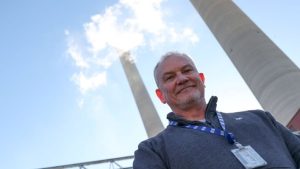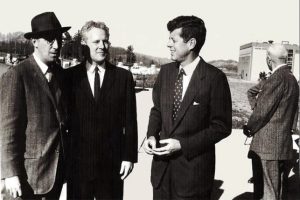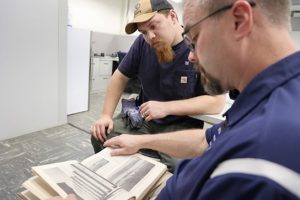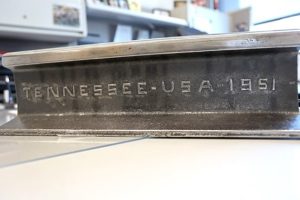Growing up in Roane County, Tennessee, Robbie Davis spent a lot of time riding around in the back seat of his family’s 1972 Monte Carlo.
 One local landmark always entranced him.
One local landmark always entranced him.
The twin 1,000-foot chimneys towering over Tennessee Valley Authority’s Kingston Fossil Plant.
“I just remember being in awe of how big they were,” Robbie said.
Cruising past on Interstate 40 as a young adult, Richard Turner had a similar experience. “I remember driving by and saying, ‘My gosh, what do they make at that plant?’ I’d never seen a plant that size.”
Robbie and Richard both now work at the enormous coal-fired power plant, which provides electricity for up to 800,000 homes.
They’re among about 200 employees who’ve received some big news.
TVA has formally announced its decision to retire all nine coal-fired units at Kingston by the end of 2027. In addition, TVA plans to build a first-of-its-kind energy complex consisting of natural gas, solar and battery storage to maintain uninterrupted power to customers.
It’s a historic decision. Kingston has been a fixture to the Knoxville region since the 1950s when the new plant attracted visitors on a national scale, including an ambitious young senator from Massachusetts  named John Fitzgerald Kennedy.
named John Fitzgerald Kennedy.
And according to CEO Jeff Lyash, the decision benefits all 10 million people in TVA’s seven-state service area.
“TVA is building the energy system of the future to ensure low rates, high reliability and increasingly cleaner generation,” Jeff said. “The decision to retire Kingston supports this generational transition and aligns with our goal to reduce carbon.”
Then-Sen. John F. Kennedy of Massachusetts visits Kingston in 1959 with then-Sen. Albert Gore Sr. of Tennessee (second from left) and others.
‘Skilled and Dedicated’
The retirement announcement capped a multi-year process of weighing options, evaluating environmental impacts and seeking public input.
The coal fleet is among the oldest in the nation. Kingston is becoming increasingly difficult to operate, leaders say, because the age and condition of the units create environmental, economic and reliability challenges.
Kingston will be the 10th coal plant retired by TVA, and the eighth since 2012.
Kingston’s retirement will leave just three active plants in TVA’s coal fleet: Cumberland Fossil Plant (one unit) in Stewart County, Tennessee, Gallatin Fossil Plant in Sumner County, Tennessee, and Shawnee Fossil Plant near Paducah, Kentucky.
“Choosing to retire our coal assets is not an easy decision,” Kris Edmondson, TVA vice president of coal operations, said. “Our people have done a tremendous job meeting the operational challenges of an aging coal fleet.”
The announcement gives Kingston employees several years to plan their next career moves.
And TVA leaders say they’re committed to supporting employees.
“TVA has a detailed workforce plan to maintain coal plant expertise through closure,” Allen Clare, senior vice president of power operations, said. “Employees will have options to transfer their skills into other career opportunities, such as operating the new energy complex.
“These are highly skilled and dedicated individuals,” Allen said. “We are focused on retention and supporting smooth transitions to their next career step.”

Luke Huddleston, left, a Kingston trainee, pores over a book of Kingston history with his father, Daniel, a longtime employee.
Replacing the Megawatts
It is essential to have replacement power up and running by the time Kingston’s nine coal-burning units – capable of generating almost 1,400 megawatts of power – are taken offline.
“Kingston’s location in TVA’s transmission system makes it integral to power system stability,” Jeff said.
TVA plans to build an energy complex housing at least 1,500 megawatts of natural gas generating capacity, along with 100 megawatts of battery storage and up to 4 megawatts of solar.
“The natural gas generation will be in operation prior to Kingston Fossil Plant retirement,” Jeff said. “Natural gas is the only mature technology available today that can be available by the end of 2027, and it’s the best overall solution to provide low-cost, reliable and cleaner energy to the TVA power system.”
Moreover, natural gas produces less than half the carbon emissions of the retiring coal units, Jeff said. And it provides the flexibility to integrate solar and other renewables, not just at Kingston but across the grid.
“We need year-round, firm, dispatchable power, like natural gas, for when the sun isn’t shining,” Jeff said.
The addition of battery storage and solar power at the site dovetails with TVA’s overall goal to add up to 10,000 megawatts of solar power by 2035.
Two types of natural gas facilities are planned at Kingston: a combined cycle plant and a fleet of aeroderivative combustion turbines.
The combined cycle plant couples three natural gas-burning turbines with a secondary steam turbine to maximize efficiency, while the 16 small aeroderivative units can quickly go from startup to full generating capacity to meet peaks in demand.

Plant operations manager Richard “RT” Turner shows off photos from Kingston’s construction in the early 1950s.
History on Display
For longtime Kingston employees, the retirement announcement is a chance to reflect.
“I’m proud to have been here at this plant my whole career,” said Richard, once the astonished young man driving by on the interstate, who rose from trainee to the operations manager known around the plant as “RT.”
Like many around him, RT is mindful of Kingston’s respected legacy from its earliest days, when it was the largest coal plant in the world.
“It was a real showpiece and a symbol of pride, not just for Kingston but for the country as a whole,” RT said.
Kingston’s profile has changed dramatically over the decades, but visitors can still see much of its history.
A photo of Kennedy’s visit in 1959 shows a water filtration plant in the background. It’s still there, and it’s still in operation.
The original nine smokestacks, 300 feet tall, still stand. As do the two colossal chimneys that replaced them in the 1970s, themselves removed from service in favor of emission-slashing scrubbers in 2007.
Thinking back on his boyhood impressions of Kingston, Robbie said it was never the details about the landmark stacks that stuck with him.
“I remember asking my dad how tall they were, and he would throw a number out,” said Robbie, now a lead shift operations supervisor.
What stuck with him are the memories.
And that’s exactly what Robbie expects to carry forward from his years as a Kingston employee.
“The biggest thing I’ll take away from it is a lot of good memories,” Robbie said. “I’ve met a lot of great people I consider to be lifelong friends.”

This section of track comes from a rail spur line built to haul in heavy equipment when Kingston was under construction.
‘Tricycle Tire Prints’
For Daniel Huddleston, lead shift operations supervisor, the plant’s history intertwines with his own.
Daniel’s grandfather, Bennett, worked as a plant operator at Kingston after serving with the 1st Marine Division in World War II. His father, David, worked there too, and his son, Luke, is a trainee.
That makes four generations.
Daniel gets teased about it.
The joke: “My tricycle tire prints are in the concrete out here.”
Daniel recalls family gatherings when he was a kid, after his grandfather’s retirement.
“We’d go to his house to eat. The first question out of his mouth was, ‘What’s going on at the plant?’ After my dad’s retirement, I got the same questions from him,” Daniel said. “It’s always in your blood once you get in this business.”
The camaraderie runs deep with all plant personnel, he said.
“When you work 12-hour rotating shifts, you spend about as much time out here as with your family,” Daniel said. “So they become your family.”
That dedication is what makes this transition such a big deal, according to Edmondson, the coal vice president.
“This plant and the people who operate it have worked exceptionally hard for the people of the Valley region,” Kris said. “This is a bittersweet time, but Kingston will remain an important part of the fleet until its retirement. We are looking forward to a bright future for the site and the Kingston family.”
